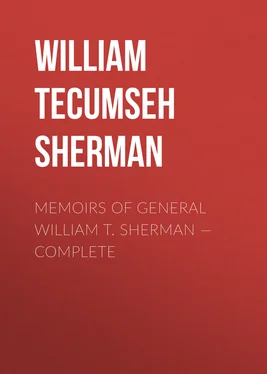William Tecumseh Sherman - Memoirs of General William T. Sherman — Complete
Здесь есть возможность читать онлайн «William Tecumseh Sherman - Memoirs of General William T. Sherman — Complete» — ознакомительный отрывок электронной книги совершенно бесплатно, а после прочтения отрывка купить полную версию. В некоторых случаях можно слушать аудио, скачать через торрент в формате fb2 и присутствует краткое содержание. Жанр: Биографии и Мемуары, История, foreign_edu, foreign_antique, foreign_prose, на английском языке. Описание произведения, (предисловие) а так же отзывы посетителей доступны на портале библиотеки ЛибКат.
- Название:Memoirs of General William T. Sherman — Complete
- Автор:
- Жанр:
- Год:неизвестен
- ISBN:нет данных
- Рейтинг книги:4 / 5. Голосов: 1
-
Избранное:Добавить в избранное
- Отзывы:
-
Ваша оценка:
- 80
- 1
- 2
- 3
- 4
- 5
Memoirs of General William T. Sherman — Complete: краткое содержание, описание и аннотация
Предлагаем к чтению аннотацию, описание, краткое содержание или предисловие (зависит от того, что написал сам автор книги «Memoirs of General William T. Sherman — Complete»). Если вы не нашли необходимую информацию о книге — напишите в комментариях, мы постараемся отыскать её.
Memoirs of General William T. Sherman — Complete — читать онлайн ознакомительный отрывок
Ниже представлен текст книги, разбитый по страницам. Система сохранения места последней прочитанной страницы, позволяет с удобством читать онлайн бесплатно книгу «Memoirs of General William T. Sherman — Complete», без необходимости каждый раз заново искать на чём Вы остановились. Поставьте закладку, и сможете в любой момент перейти на страницу, на которой закончили чтение.
Интервал:
Закладка:
I herewith inclose the official report of Captain Belly, commanding officer of the New York Sixty-ninth; also, fall lists of the killed, wounded, and missing.
Our loss was heavy, and occurred chiefly at the point near where Rickett's battery was destroyed. Lieutenant-Colonel Haggerty was killed about noon, before we had effected a junction with Colonel Hunter's division. Colonel Cameron was mortally wounded leading his regiment in the charge, and Colonel Corcoran has been missing since the cavalry-charge near the building used as a hospital.
For names, rank, etc., of the above, I refer to the lists herewith.
Lieutenants Piper and McQuesten, of my personal staff, were under fire all day, and carried orders to and fro with as much coolness as on parade. Lieutenant Bagley, of the New York Sixty-ninth, a volunteer aide, asked leave to serve with his company, during the action, and is among those reported missing. I have intelligence that he is a prisoner, and slightly wounded.
Colonel Coon, of Wisconsin, a volunteer aide, also rendered good service during the day.
W. T. SHERMAN, Colonel commanding Brigade.This report, which I had not read probably since its date till now, recalls to me vividly the whole scene of the affair at Blackburn's Ford, when for the first time in my life I saw cannonballs strike men and crash through the trees and saplings above and around us, and realized the always sickening confusion as one approaches a fight from the rear; then the night-march from Centreville, on the Warrenton road, standing for hours wondering what was meant; the deployment along the edge of the field that sloped down to Bull-Run, and waiting for Hunter's approach on the other aide from the direction of Sudley Springs, away off to our right; the terrible scare of a poor negro who was caught between our lines; the crossing of Bull Run, and the fear lest we should be fired on by our own men; the killing of Lieutenant-Colonel Haggerty, which occurred in plain sight; and the first scenes of a field strewed with dead men and horses. Yet, at that period of the battle, we were the victors and felt jubilant. At that moment, also, my brigade passed Hunter's division; but Heintzelman's was still ahead of us, and we followed its lead along the road toward Manassas Junction, crossing a small stream and ascending a long hill, at the summit of which the battle was going on. Here my regiments came into action well, but successively, and were driven back, each in its turn. For two hours we continued to dash at the woods on our left front, which were full of rebels; but I was convinced their organization was broken, and that they had simply halted there and taken advantage of these woods as a cover, to reach which we had to pass over the intervening fields about the Henry House, which were clear, open, and gave them a decided advantage. After I had put in each of my regiments, and had them driven back to the cover of the road, I had no idea that we were beaten, but reformed the regiments in line in their proper order, and only wanted a little rest, when I found that my brigade was almost alone, except Syke's regulars, who had formed square against cavalry and were coming back. I then realized that the whole army was "in retreat," and that my own men were individually making back for the stone bridge. Corcoran and I formed the brigade into an irregular square, but it fell to pieces; and, along with a crowd, disorganized but not much scared, the brigade got back to Centreville to our former camps. Corcoran was captured, and held a prisoner for some time; but I got safe to Centreville. I saw General McDowell in Centreville, and understood that several of his divisions had not been engaged at all, that he would reorganize them at Centreville, and there await the enemy. I got my four regiments in parallel lines in a field, the same in which we had camped before the battle, and had lain down to sleep under a tree, when I heard some one asking for me. I called out where I was, when General Tyler in person gave me orders to march back to our camps at Fort Corcoran. I aroused my aides, gave them orders to call up the sleeping men, have each regiment to leave the field by a flank and to take the same road back by which we had come. It was near midnight, and the road was full of troops, wagons, and batteries. We tried to keep our regiments separate, but all became inextricably mixed. Toward morning we reached Vienna, where I slept some hours, and the next day, about noon, we reached Fort Corcoran.
A slow, mizzling rain had set in, and probably a more gloomy day never presented itself. All organization seemed to be at an end; but I and my staff labored hard to collect our men into their proper companies and into their former camps, and, on the 23d of July, I moved the Second Wisconsin and Seventy-ninth New York closer in to Fort Corcoran, and got things in better order than I had expected. Of course, we took it for granted that the rebels would be on our heels, and we accordingly prepared to defend our posts. By the 25th I had collected all the materials, made my report, and had my brigade about as well governed as any in that army; although most of the ninety-day men, especially the Sixty-ninth, had become extremely tired of the war, and wanted to go home. Some of them were so mutinous, at one time, that I had the battery to unlimber, threatening, if they dared to leave camp without orders, I would open fire on them. Drills and the daily exercises were resumed, and I ordered that at the three principal roll-calls the men should form ranks with belts and muskets, and that they should keep their ranks until I in person had received the reports and had dismissed them. The Sixty-ninth still occupied Fort Corcoran, and one morning, after reveille, when I had just received the report, had dismissed the regiment, and was leaving, I found myself in a crowd of men crossing the drawbridge on their way to a barn close by, where they had their sinks; among them was an officer, who said: "Colonel, I am going to New York today. What can I do for you?" I answered: "How can you go to New York? I do not remember to have signed a leave for you." He said, "No; he did not want a leave. He had engaged to serve three months, and had already served more than that time. If the Government did not intend to pay him, he could afford to lose the money; that he was a lawyer, and had neglected his business long enough, and was then going home." I noticed that a good many of the soldiers had paused about us to listen, and knew that, if this officer could defy me, they also would. So I turned on him sharp, and said: "Captain, this question of your term of service has been submitted to the rightful authority, and the decision has been published in orders. You are a soldier, and must submit to orders till you are properly discharged. If you attempt to leave without orders, it will be mutiny, and I will shoot you like a dog! Go back into the fort now, instantly, and don't dare to leave without my consent." I had on an overcoat, and may have had my hand about the breast, for he looked at me hard, paused a moment, and then turned back into the fort. The men scattered, and I returned to the house where I was quartered, close by.
That same day, which must have been about July 26th, I was near the river-bank, looking at a block-house which had been built for the defense of the aqueduct, when I saw a carriage coming by the road that crossed the Potomac River at Georgetown by a ferry. I thought I recognized in the carriage the person of President Lincoln. I hurried across a bend, so as to stand by the road-side as the carriage passed. I was in uniform, with a sword on, and was recognized by Mr. Lincoln and Mr. Seward, who rode side by side in an open hack. I inquired if they were going to my camps, and Mr. Lincoln said: "Yes; we heard that you had got over the big scare, and we thought we would come over and see the 'boys.'" The roads had been much changed and were rough. I asked if I might give directions to his coachman, he promptly invited me to jump in and to tell the coachman which way to drive. Intending to begin on the right and follow round to the left, I turned the driver into a side-road which led up a very steep hill, and, seeing a soldier, called to him and sent him up hurriedly to announce to the colonel (Bennett, I think) that the President was coming: As we slowly ascended the hill, I discovered that Mr. Lincoln was full of feeling, and wanted to encourage our men. I asked if he intended to speak to them, and he said he would like to. I asked him then to please discourage all cheering, noise, or any sort of confusion; that we had had enough of it before Bull Run to ruin any set of men, and that what we needed were cool, thoughtful, hard-fighting soldiers—no more hurrahing, no more humbug. He took my remarks in the most perfect good-nature. Before we had reached the first camp, I heard the drum beating the "assembly," saw the men running for their tents, and in a few minutes the regiment was in line, arms presented, and then brought to an order and "parade rest!"
Читать дальшеИнтервал:
Закладка:
Похожие книги на «Memoirs of General William T. Sherman — Complete»
Представляем Вашему вниманию похожие книги на «Memoirs of General William T. Sherman — Complete» списком для выбора. Мы отобрали схожую по названию и смыслу литературу в надежде предоставить читателям больше вариантов отыскать новые, интересные, ещё непрочитанные произведения.
Обсуждение, отзывы о книге «Memoirs of General William T. Sherman — Complete» и просто собственные мнения читателей. Оставьте ваши комментарии, напишите, что Вы думаете о произведении, его смысле или главных героях. Укажите что конкретно понравилось, а что нет, и почему Вы так считаете.












